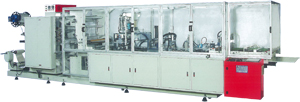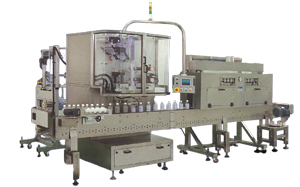Taiwan Packaging Machine Makers' Main Market Shifts to China
2011/01/11 | By Ken LiuMarket diversification works well to lessen impact from recession
Taiwan did not become the world's fourth-largest maker of plastic-processing equipment by chance, with the island's suppliers over the past two decades, including those specializing in packaging equipment, having focused on quality, user-friendliness, automation and green materials.
Dr. Z.W. Chiou, a senior manager and project director of the Taiwan government-backed Plastics Industry Development Center, says that many local equipment manufacturers are supplying more energy-efficient machines that also generate less waste and are able to process bio-degradable plastics like PLA (polylactic acid).
Chiou adds that Taiwan's packaging machines, like its plastic-processing machines, are very popular in developing markets and even some industrially-advanced markets for competitive pricing yet good quality. Consequently, Taiwan's exports of food and packaging machinery surged 24.9% throughout the first four months this year, to US$119.86 million, relative to that last year.

S-Dai Industrial
S-Dai Industrial Co., Ltd., founded some 30 years ago, specializes in packaging machines for garment, stationery, and flowers, and will unveil a series of zipper-bag side sealing and cutting machines at the K-Show 2010 plastic and rubber trade fair, to be staged Oct. 27 to Nov. 3 in Dusseldorf, Germany.
General manager C.L. Chiang says that this new family of machines comes in two models: SDH-263S-NC-Z and SDH-323S-NC-Z, with the former's output being 50 to 120 bags per minute and the latter 50 to 100 bags.
With Japan-made AC servo motors to control in-feed and German-made photocell for positioning, this series has automatic zipper in-feed and friction sealing; while computerized control boost precision of finished products, and European conveyor belt enhances durability.
The most significant change in this sector in the past 30 years has been automation, says Chiang, who attributes such change to necessity, where, for example, flower suppliers demand faster operation.
Pre-formed Bags
Citing a real-world example, Chiang says that flower suppliers, besides setting up packaging factories near airports to speed delivery, have asked the firm to develop machines to output pre-formed bags stacked automatically in piles, saving time to fold bags.
These flower-package machines consist of computerized bag maker, bag stacker, perforation & slitting machine.
A magnetic clutch and brake system ensure positioning, sealing and cutting accuracy of the bag-maker. Photocell sensors ensure accurate printing and stepless motors allow changing conveying speed, while imported conveyor belts enhance durability.
The flower-bag making machines mostly use BOPP (bi-axially oriented polypropylene) film, which Chiang says enables bags to hold upright without support.
S-Dai also supplies other machines, including bag embossing and cosseting machine, auto high-speed sealing & cutting machine, thick-bag automatic sealing & cutting machine etc., most of which are computerized to achieve 30% higher efficiency, according to Chiang. He added that the company adheres to making special packaging bags instead of typical ones used at retailers.
In the last two decades or so Taiwan's packaging-equipment makers have been selling mostly to China and other overseas markets instead of domestically, a shift evolving alongside local suppliers migrating to China, according to Chiang.

Cost-sensitive Buyers
In the beginning of the offshore migration, China had been the company's major export destination. But soon, buyers looking for Taiwanese packaging-bag makers in China came to S-Dai, for many foreign importers, wanting to cut cost, started to buy equipment to make bags themselves, hence bringing more customers to S-Dai, Chiang recalls.
S-Dai's monthly capacity is 25 packaging machines, most of which go to China, Southeast Asia, and India. The firm plans to boost shipment to Europe after acquiring the CE mark.
S-Dai can undersell Japanese and German suppliers by 30% while rival them in quality, a feat attributable mostly to Taiwan's well-developed electronics industry, says Chiang. “Many Japanese and German stationery manufacturers and florists prefer our machines to those from local makers,” he adds.
The Economic Cooperation Framework Agreement (ECFA) signed recently between Taiwan and China includes S-Dai among the fast-tracked gainers, hence eliminating the 17% tariff on machines shipped to China, which is good news, says Chiang.
Hanyamn Joung Industrial
Established in 1979, Hanyamn Joung Industrial Co., Ltd. specializes in making vacuum-forming machines to produce lunch boxes, dish trays, cups, tool boxes, electric-parts packages, cookie boxes, masks and other products of PSP, PS, PP, PVC, ABS, PET and PLA, among others.
The company is promoting a collection of micro-computerized machines as chain-style continuous vacuum forming machine, double mold base fully automatic vacuum forming machine, auto feeding hydraulic cutting machine, four-column type of plane hydraulic cutting machine, fully automatic vacuum forming machine.
Its chain-style continuous vacuum forming machine comes in four models depending on form size and power. The HR6012-A and HR7012-A are equipped with 7 1/2 horse-power vacuum pump while the other two types are equipped with 10-HP pump.
This family of machines uses ceramic heaters for energy- and output- efficiency, as well as micro controllers to handle feeding speed, time setting, and operation security.
The DC motors ensure strong pulling force, processing accuracy and steady material conveying, as well as boasting automatic height and depth adjustability of molds.
The human-machine interface enables easy operation, allowing up to 360 parameters to be stored to control temperature, time, number of forms. “This function allows especially new operators to quickly change molds without spending much time,” says Yang Dongmou, the president.
The continuous vacuum forming machines, Yang notes, boast output rate of 10 packages per minute, making them suitable for volume production of standard packages. In contrast, the fully-automatic vacuum forming machines fit low-volume production of diversified products with output of 3-5 bags per minute.
The company's double-mold vacuum forming machines save 60% in electricity relative to single-mold types as they put out twice as many packages in equal time.
Besides output efficiency, the company's machines are safe, with sensors enabling auto shutoff in case of malfunction. “The auto shutoff also activates in case of mistaken command on the touch-control screen,” Yang stresses.

More Efficient
Yang says that his machines now are 30-40% more efficient than they were about 10 years ago, and are more accurate in production while delivering much lower defects, all of which are due to using Japan-made key components to control computers and air compressors.
In the business for over 30 years, Yang sees the market shift as the most drastic change over the past 20 years. “Twenty years ago, Taiwan accounted for 70-80% of corporate sales, but only around 20% today as most of my customers are in China,” he says.
The recent recovery of the global economy, Yang says, has helped the company's exports. Better yet, ECFA, he says, will help ratchet up exports to China, which has an immense packaging market. The vast market has inspired him to open three factories in northern China to turn out vacuum-formed packages instead of equipment to meet demand. Hon Hai Precision and Chi Mei Optoelectronics are among the customers, according to Yang. “Our mainland factories need at least 20 to 30 tons of plastics daily and a contract there usually calls for 50 to 60 million packages, 10 times as many as one received in Taiwan. And to evade competing against equipment buyers in China, mostly in the south, the packaging factories have been set up purposefully in the north,” says Yang.
Benison & Co., Ltd.
Benison & Co., Ltd. is Taiwan's leading supplier of heat shrinkable films and machines that serve food, electronics, and chemicals operators. The general manager, Benker Liao, stresses that business would be very hard for packaging-equipment manufacturers to still depend on manually-operated machinery. However, Liao thinks, based on experience, computerization is not the only way to achieve automation. “Some buyers specify computerized machines whereas some buyers usually prefer mechanically-controlled devices,” he notes.
Liao says that he offers mechanical or semi-automatic machines to buyers in remote areas far from maintenance and repair shops, but computerized ones to buyers in urban areas brimming with support services. “Computerized machines call for tech support whereas mechanically-operated machines sometime allow users to tinker by themselves,” he elaborates.
The company has recently introduced several easy-to-use automated machines, including automatic tamper-evident sleeving machine, super hi-speed label/tamper-evident sleeving machine, automatic side-seal sealer, automatic L-type series sealer and heat shrinking tunnels.
This automatic tamper-evident sleeving machine comes in CP-50 and CH-100 models, and can finish 100-120 packagings per minute, as well as suitable for PET, PVC and OPS plastics.
The L-type series sealers come in standard, LSA-504C and LSA-504G (CE) models, being ideal for shrink-wrapping thin and small products, with discharge and shrink adjustment fully automated.
The USA004B automatic side-seal sealer features a dual-track system that holds products in place for smooth operation.
Branched Out
Founded in 1962 by Liao's father to produce packaging materials, the company saw Liao junior branch out into equipment manufacturing upon taking over the family business in 1986. “We could not raise sale volume without equipment sales,” explains Liao.
The company's packaging material line now includes PT, OPS and PLA, in addition to PVC, PP and PE, as well as being Taiwan's first homegrown supplier of PLA, says Liao.
Liao has enhanced added-value by working with American and Japanese equipment manufacturers, which command the world's most advanced technology for making packaging equipment and materials. The company is a contract supplier of machines in industrially advanced markets, but offers branded products in developing markets like China.
Being CE certified attests to the company's quality meeting European standards. “Most European nations impose very stringent safety standards on equipment and CE proves our products are safe in electrical power, drive or cutting design. Our machines automatically shut off upon sensing unsafe operation,” Liao stresses. Europe contributes around 10% of corporate sales, roughly the same as China and the United States.
Market diversification helps the company to be less susceptible to recession, and the company has over 100 dealers in some 40 nations.
Reliable Brand
Benison has operated in China for 10 years where it is a reliable brand, according to Liao. But his company never competes with local manufacturers in China because his company specializes in niche market machines requiring high production precision whereas the local makers dominate commodity markets calling for only acceptable precision. “China undoubtedly has vast opportunity but underselling is intense there,” he analyzes.
Unlike many of his peers from Taiwan, Liao does not think the ECFA will benefit his business in China. “My company is not included in the agreement. Besides, we have diversified markets. I believe ECFA is only a plot by China to lure Taiwan into reunification,” says Liao, who runs a factory in Shanghai to make machines for China and Southeast Asia.
The company's strength is to offer total-solutions, which include not only training but also made-to-order design, as well as having 10 English-literate engineers to show customers how to operate the company's latest machines, says Liao.
Liao believes the packaging equipment segment will continue to expand along with newer packaging materials, but cautions more newcomers will intensify competition, urging makers have to supply machines that are in demand.




